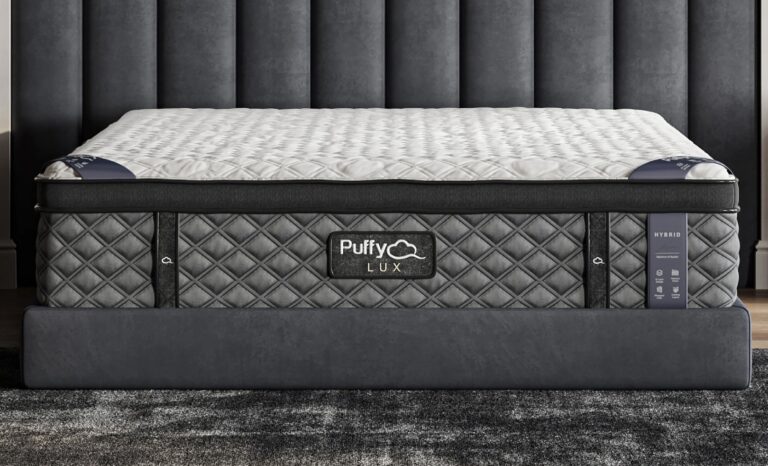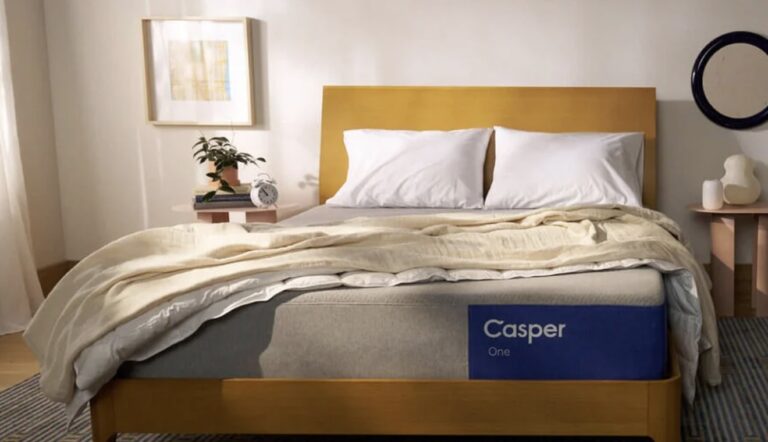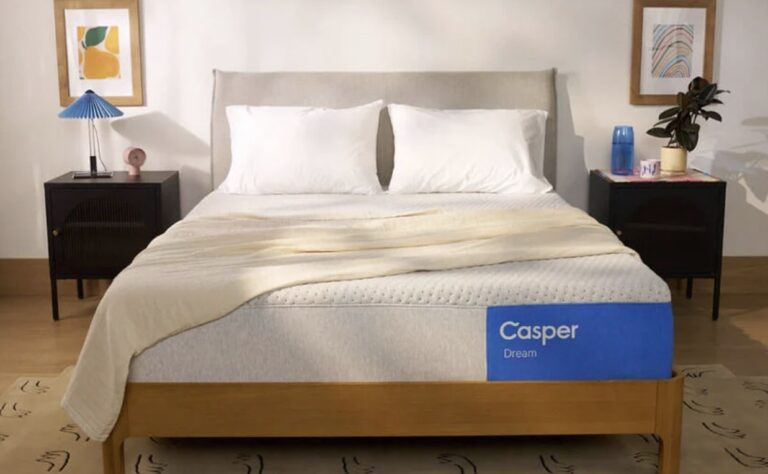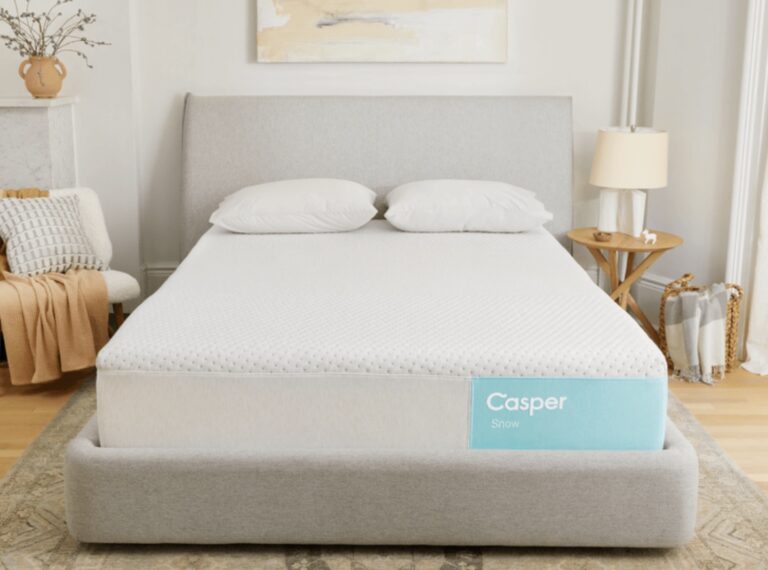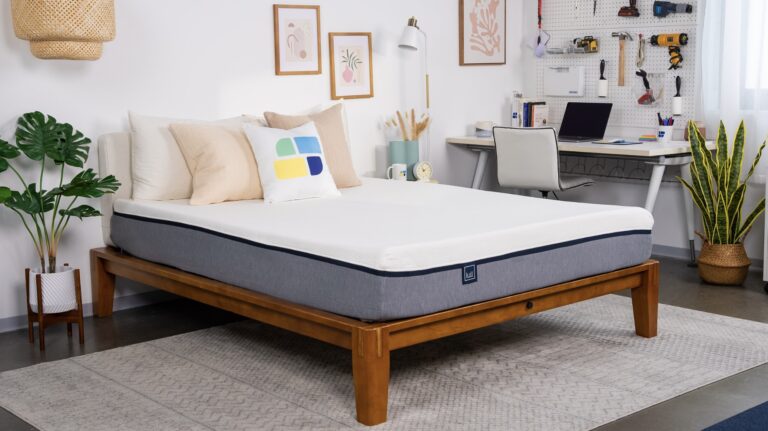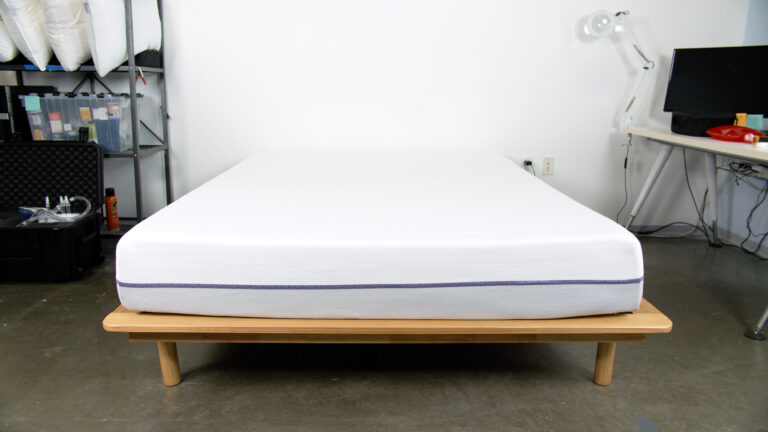When you buy through our links, we may earn a commission. Products or services may be offered by an affiliated entity. Learn more.
Puffy vs. Casper Mattress Comparison
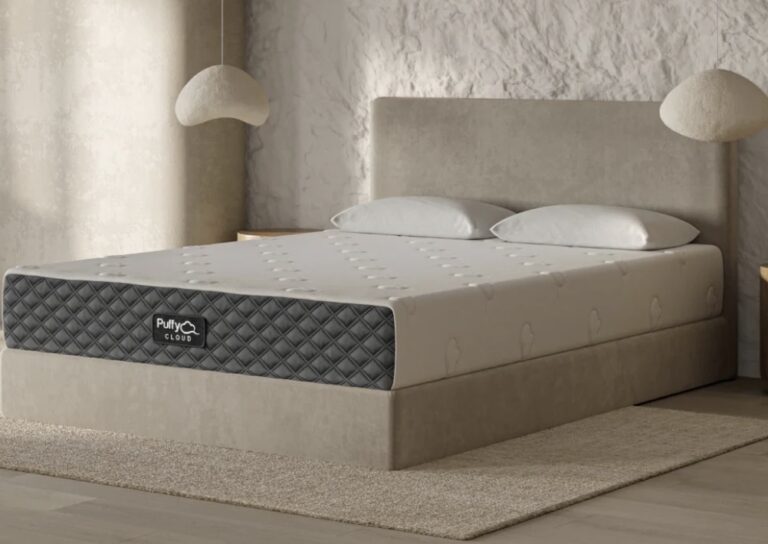
Puffy Cloud Mattress
Bottom Line
The Puffy Cloud uses memory foam and polyfoam to relieve pressure by closely contouring to the body.
$750 off + free accessories at Puffy
Full Mattress ReviewVS
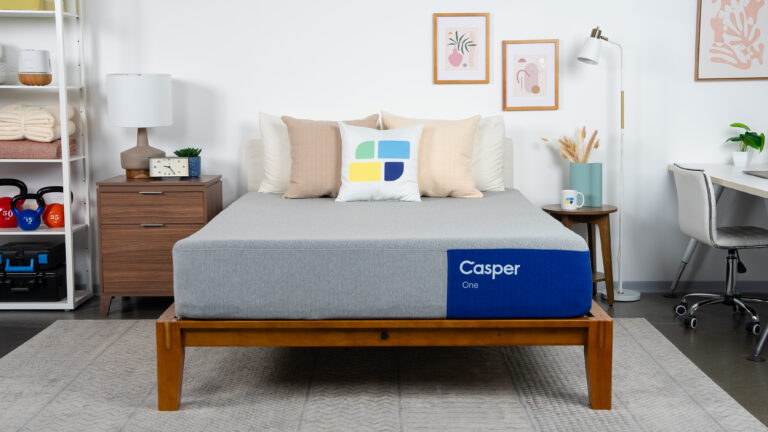
Casper One
Bottom Line
The Casper One similarly combines memory foam and polyfoam in a pressure-relieving build, but with a firmer, more supportive feel.
Click for the best Casper mattress deals
Full Mattress ReviewCasper and Puffy are two well-known names in the online mattress retailer world. Casper was founded in 2014 and was one of the first companies in the bed-in-a-box revolution. Puffy wasn’t far behind, starting up in 2017. Both companies began with flagship all-foam models and have expanded their product lines to include hybrid mattresses, bed bases, and bedding.
In 2024, Casper relaunched its product line with new and improved versions of its beds. The Casper One is the newest evolution of the company’s Casper Original Mattress. The Puffy Cloud is also a revamped flagship mattress. Originally called the Puffy Mattress, the Puffy Cloud has new enhancements including cooling features.
Our team took an in-depth look at both the Casper One and Puffy Cloud mattresses to see how they performed in real-life settings and our sleep lab. We’ll explain how these beds feel and highlight their pros and cons. We’ll also look at their prices, durability, and constructions so that you can decide whether one of these beds is the right purchase for you.
Quick Look
$1,049
$799
Medium (5)
Medium Firm (6)
- Traditional memory foam feel with deep contouring
- Excellent motion isolation for couples and no noise
- Very good overall pressure relief for side and back sleepers
- Sleeps cool for a memory foam bed
- 101 Nights (14-night requirement)
- Lifetime, Limited
- 100 nights (30-night requirement)
- 10 years, limited
- A+
- A+
Our Testing Team’s Take
When we review mattresses, the first step is bringing them into our sleep lab in Seattle. In the lab, we’ve tested almost 2,000 mattresses across nearly a decade to find the best mattress out there. We use tools to help us measure heat retention, pressure relief, and motion isolation among other performance factors.
We also have our testing team try each mattress to determine how comfortable and supportive it feels for their weight and sleeping position. Our standards are rigorous and we use the same careful methodology for every bed to help our readers choose the best mattress.
Our Verdict
Anyone looking for a high-quality memory foam mattress with mid-range firmness will find that both these beds fit the bill. Though they aren’t budget mattresses, The Casper One and Puffy Cloud are quite affordable and decently durable. They both excel where you expect memory foam mattresses to – they’re pressure-relieving, motion-isolating, and quite comfortable for their intended audiences.

Colin Simpson
Product Research Manager
Side sleeper
190 pounds
Talks in sleep (like a lot)
As soon as I lay down on the Puffy Cloud, I was impressed by its pressure relief. I’m a side sleeper, so I pay close attention to how well a mattress cushions my hips and shoulders. The Puffy Cloud really softened impact in those areas, letting me rest comfortably.
Choosing between the two comes down to a couple of factors. The Puffy Cloud lives up to its name and is quite plush. Its medium (5) firmness is best for people who want a mattress with plenty of cushioning. Those seeking a more balanced feel will probably enjoy the slightly firmer Casper One. The Casper One is also a bit better at regulating temperature, which may be an important factor for hot sleepers to consider. Price-wise, the two beds are comparable, as are their company policies.

Logan Foley
Editorial Director
Side sleeper
140 pounds
Has too many dogs in the bed
One of the things that stood out the most to me was how well the Casper One absorbed motion. I liked that I wasn’t bothered by movement on the other side of the bed. I also felt that the mattress had a good mix of pressure relief and pushback.
Construction and Materials
While these two mattresses may seem to have nearly identical constructions at first glance, there are a few key material differences between them.
| Construction Analysis | Puffy Cloud Mattress | Casper One Mattress |
|---|---|---|
| Cover | Stain-resistant polyester | Polyester, polyethylene, and Lycra blend |
| Comfort Layer | 2” memory foam (gel-infused) | Polyfoam |
| Transitional Layer | 2” polyfoam | Memory foam |
| Support Core | 6” polyfoam | Polyfoam |
Puffy Cloud Breakdown
The Puffy Cloud has a straightforward but effective design. It has three layers wrapped in a stain-resistant polyester cover. The fabric includes fibers engineered to give the bed a cool-to-the-touch feel and airflow. The bed’s first layer, called Cooling Cloud, is 2 inches of gel-infused memory foam that’s designed to adapt to the body’s shape without retaining as much heat as traditional memory foam.
The polyfoam transitional layer is also 2 inches thick and made from proprietary foam named Climate Comfort which is meant to keep your spine aligned while preventing pressure points from developing. The 6-inch polyfoam support core anchors the mattress and provides a strong, stable base. Beneath the support core, there’s a base cover with grippy fabric that keeps the mattress from sliding on its base.
It’s 10 inches tall in total and is a 5 out of 10 on our firmness scale, giving it a medium feel. Puffy manufactures this mattress in the U.S. using foam that’s Certi-PUR-US certified, meaning its foams have low volatile organic compound (VOC) emissions and don’t contain any harsh chemicals or heavy metals.
Casper One Breakdown
Like the Puffy Cloud, the Casper One has three layers and an all-foam construction featuring patented foams. The cover is a stretchy, soft knit fabric made from a blend of polyester, polyethylene, and Lycra. The first foam layer is AirScape polyfoam which has an open cell structure aimed at preventing sleepers from overheating.
The transitional layer is made from another proprietary foam called Align, which is a memory foam that adapts to your body’s shape to cradle your joints and disperse body weight to alleviate pressure points. The final layer is the mattress’ support core. It’s made from a thick layer of polyfoam that helps sleepers maintain spinal alignment while preventing sagging and sinking.
The Casper One is a medium firm (6) bed that’s one step firmer than the Puffy Cloud. Its foams are also Certi-PUR-US certified.
Mattress Sizing and Weight
The Puffy Cloud and the Casper One are available in the same standard size range. They come in twin, twin XL, full, queen, king, California king, and split king. The Puffy Cloud measures 10 inches tall, while the Casper One is 11 inches. Both beds fit easily within standard pocket fitted sheets. The Casper outweighs the Puffy Cloud by about 20 pounds, so you’ll want to get a partner’s help moving the mattress.
| Mattress Model | Profile | Weight (Queen) |
|---|---|---|
| Puffy Cloud | 10” | 54 lbs. |
| Casper One | 11” | 76 lbs. |
Performance Ratings
During performance testing trials, the Casper One and Puffy Cloud got very similar scores in nearly every category. Their best scores were in the motion isolation and pressure relief categories, which is no surprise considering their memory foam and polyfoam comfort systems.
People who wake easily with their partner’s movement should be able to sleep on either of these beds without much disturbance. The same goes for people who experience pressure points, both beds are excellent at easing pain beneath joints and pressure-prone areas.
These beds both fall short in the same categories as well. Neither has a reinforced perimeter and edge support is lacking as a result. Both beds are a bit restrictive to move around on and don’t have much buoyancy. You’ll also notice some off-gassing odor with both of these mattresses, though neither is long-lasting.
The major difference lies in temperature regulation, with the Casper One offering a better performance than the Puffy Cloud. Its open cell foam seems to work well at preventing heat retention and the bed sleeps cooler than many other all-foam beds. However, it’s still not totally cool, and very hot sleepers may want to look at a hybrid.
The Casper One’s medium firm (6) feel proved a bit more versatile for the testers on our team than the Puffy Cloud’s medium firmness. With that said, the Puffy was an excellent fit for the side sleepers under 230 pounds who gave it very high scores. The Casper was ideal for side sleepers between 130 and 230 pounds as well as back sleepers under 130 pounds. Both beds were too soft for stomach sleepers and people over 230 pounds.
Mattress Pricing
When buying a memory foam or bed-in-a-box mattress online, you can expect to pay between $700 and $1,200 for an average model. Both the Puffy Cloud and Casper One are within this range and are comparable to one another price-wise, with the Puffy Cloud costing slightly more than the Casper One – though both models often go on sale.
Their company policies are similar, both include free shipping and sleep trials of nearly the same length. The Puffy Cloud carries a lifetime warranty, while the Casper’s is 10 years.
| Policy | Puffy | Casper |
|---|---|---|
| Sleep Trial | 101 nights | 100 nights |
| Warranty | Lifetime, limited | 10-year, limited |
| Shipping | Free to all 50 states | Free to contiguous U.S. and Canadian provinces |
| White Glove Delivery | N/A | Available in the contiguous U.S. for $249 |
What Customers Are Saying
The Puffy Cloud gets excellent reviews from side sleepers and customers with joint pain who give it high marks for its cushioning and plush feel. Couples who own the mattress also like how well it isolates motion. It’s a bit too soft for people who like a more even sleep surface and those over 230 pounds.
Reviewers report that The Casper One doesn’t feel quite as plush as the Puffy Cloud, but that it’s versatile for combination sleepers and is a better fit for anyone who prefers a less adaptive feel. Side sleepers say they’d prefer a bit more cushioning. Owners of both beds think they do a decent job of regulating temperature, but the Casper One seems to have a bit of an edge over the Puffy Cloud for hot sleepers.

Still have questions? Ask our community!
Join our Sleep Care Community — a trusted hub of product specialists, sleep health professionals, and people just like you. Whether you’re searching for the perfect mattress or need expert sleep advice, we’ve got you covered. Get personalized guidance from the experts who know sleep best.
